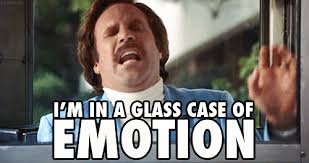This week’s readings focused solely on Zimbardo (2008). While I was reading, it brought me back to a discussion that we had in one of our first seminars. We were discussing this idea that we called an “inoculation to evil”. Since we have been educated and exposed to how or why people do evil things that we would know better and not give into these forces to commit evil acts. Our education and exposure through a class, in particular, like the Psychology of Evil, has almost given us the anti-bodies against evil. Zimbardo really challenges this in his book and it’s something that’s been challenging me. Could situational forces really influence me that much? I really want to say no, and in our initial discussion I did. But reading more into Zimbardo’s Experiment, seeing all the participants transform, including Zimbardo, and learning about the study’s findings has really challenged me to think otherwise.
“We all want to believe in our inner power, our sense of personal agency, to resist external situational forces of the kinds operating in…” (Zimbardo, 2008)
“…maintaining that illusion only serves to make one more vulnerable to manipulation by falling to be sufficiently vigilant against attempts of undesired influence subtly practiced on them” (Zimbardo, 2008)
“…most of us can undergo significant transformations when we are caught up in the crucible of social forces” (Zimbardo, 2008)
It’s not the greatest feeling when you’re basically told that you are more vulnerable to manipulation when you believe in your inner strength to be influenced; this part of the reading made me feel mad, sad and “well..maybe he is right”. SO. MANY. EMOTIONS.

I came across a journal article that focuses on whether the law can prevent good people from going bad, and it discusses cognitive dissonance and persuasion into wrongdoing. This further demonstrated to me how permeable this line of ‘good’ and ‘evil’ is. Something interesting that Crump (2008) explains is the “small steps” technique; it is “much easier to induce individuals to shift attitudes if they already have taken steps in the desired direction”. This can be seen in some of the guards in Zimbardo’s experiment. Some of them did not seem as comfortable with the others to participant in humiliating and abusing the prisoners. However, as time went on and they were exposed to the behaviour, they were able to change their cognitions in order to rationalize their behaviour.
It’s just a scary thought, too. I mean, that means that there are so many more people then I would like to think that are capable of being influenced into ‘evil’, including myself. Regardless of what Zimbardo (2008) says or how well Crump (2008) explains how there are logical ways of why/ how good people turn evil, I am just going to stay in my little naïve bubble and continue to believe in my abilities to resist evil – it’s a happier bubble. But hey, maybe our education in psychology, particularly this course, does give us some “evil anti-bodies”. I’d like to think so.
Do you think you think that you are more equipped to dealing with the influences of evil in the world after being educated in Psychology courses, particularly this one?
Throughout the readings something else I kept thinking about was, “where the heck are these guys now?”. I wonder about the effects, both negative and positive that this experiment may have had on their lives. Clearly this took an emotional toll on everyone, some more then others, so surely it wasn’t something that was just easily pushed into their past. I did some searching on the internet and most of the information said that Zimbardo had made comments that the participants had shown no negative lasting effects. (Hmm..or maybe this was his comment because it would make him look even worse if he had put individuals through such an emotional traumatizing experiment that it affected them long into their lives). Anyways, I did find a webpage where they discuss some of the participants and “where they are now”. Some of them went on to pursure careers in law which I found interesting. At least they got something out of it (?). Also, there is this site that I came across. Some of the individual’s part of the experiement talk about what they think about it 40 years later – it’s a pretty interesting read of first-hand accounts!
Do you think that some of the individuals may have experienced some lasting effects?
That’s all from me for this week! Hope you enjoyed! See you soon for another week of class..and my presentation (EEK!)

Kylie Robinson
References
Crump, D. (2008). The Social Psychology of Evil: Can the Law Prevent Groups from Making Good People Go Bad. BYU Law Review, 2008(5).
O’Toole, K. The Stanford Prison Experiment: Still powerful after all these years. Retrieved from https://news.stanford.edu/pr/97/970108prisonexp.html
Ratnesar, R. (2011). Cover Story: The Menace Within. Retrieved from https://alumni.stanford.edu/get/page/magazine/article/?article_id=40741
Zimbardo, P. (2008). The Lucifer effect: Understanding how good people turn evil. New York, NY: Random House Trade Paperbacks.
Great post this week, I really enjoyed how you looked into the experiment beyond what happened immediately following it. Idealistically I would like to say that I’m more capable of dealing with evil after this course, but that might be a bit far fetched. I was also one of the people who originally stated that in certain situations there isn’t much I wouldn’t do to say myself and the people I love. If that makes me evil in that situation then so be it.
Regarding the members of the SPE I find it difficult to believe they would have left the experiment without some kind of lasting effect. Being that it’s been 40 years since the experiment such effects have possibly faded or they may have just become an everyday part of life for these individuals. But I find it hard to believe that individuals who have gone through a traumatic experience such as this do not have scars from it.
Again great post!
Kayleigh
LikeLike
Hi Kylie!
I liked your post and your presentation will be fine girl! 🙂
In a way I think that I am a wee bit more equipped to deal with evil if it were to come my way. In saying this I do think we are fragile beings and if a Stanford professor can become vulnerable to his own experiment I feel like there may be little hope. I also know that if I search deep,deep down into my soul that I would probably be vulnerable to evil like the guards were but some were not as bad as others, some were just doing their jobs. I think a good question to ask would be what kind of evil would you partake in? Would you be the front runner or the bystander? I think that the person or people who don’t do anything can be just as much be at fault as those who do do the evil.
I feel like there could have been lasting effects but if they always reminded themselves that it was an experiment and it would be over soon maybe that helped them and shielded them from truly harmful effects. I think that would be the difference between them and actual prisoners who have gone through these horrible conditions in real life, they don’t know when they are going to get out or if they will ever get out while the men in the study knew that they would be leaving after at most 2 weeks. In saying this that does not mean they didn’t suffer from lasting effects but it could have curbed them.
LikeLike